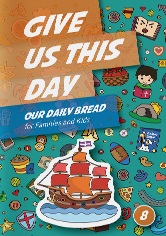
I was first introduced to Christianity at the age of 10. I was walking past an old shophouse in my neighbourhood one Sunday afternoon, when two ladies at the gate invited me to go in for some snacks, Milo, and stories. It turned out that the shophouse was being used as a temporary church.
The free food and drinks were too tempting to resist, so I walked in, grabbed my share of chocolate chip cookies and a packet of Milo, and sat down with a bunch of kids on the floor mats to munch our goodies down.
But when the storytelling began, I was spellbound! I almost stopped eating, mesmerised by the tales of Noah building a huge boat to save all the animals; of a young shepherd boy who bravely fought a giant warrior and killed him with his sling-shot; of this powerful and mysterious man who could perform all kinds of miracles, yet gave up his life to save others.
Give Us This Day #8
Get a copy of our latest family devotional!
Our latest resource, Give Us This Day #8, is now available.
Every month, we roll out a new resource for families. Subscribe to our email updates, and be the first to get a copy!
I left the session totally captivated. I believe that was how God first etched His words in my mind; to this day, I can still remember all the stories vividly.
Fast forward 15 years—I was 25 and had just graduated from university. It was a difficult period in my life: I struggled with family and relationship issues, had no aim nor ambition, and didn’t know what I was supposed to do with my life.
I sought solace in God, hoping that He would provide answers to all my problems. However, as I was not really a follower then—I believed in God but lived my life the way I wanted, turning to Him only when I needed Him—I did not know how to pray or to seek His guidance.
I have discovered that reading the Bible and learning about God and His Word is not an easy task. Like many people, I have lost the passion at times, got discouraged, and given up.
So I challenged myself to read the Bible from start to finish, page by page. I thought that God would talk to me when I reached the right section of the Bible. But that voice never came, and I struggled to keep on reading. The whole experience was painful and pointless, and I cannot remember much of what I read.
Fast forward another 15 years—I was 40 years old and seeking a rejuvenation of my Christian walk. I felt that I needed guidance in studying the Bible, so I joined the Bible Study Fellowship. Over weeks and months, I followed the programme diligently, reading books in the Bible systematically, listening to the weekly sermons, doing the worksheets, taking part in group discussions, and praying for God’s guidance.
It turned out to be a tremendous learning experience, as I learnt much from biblical mentors and the fellowship of other Christians.
Why am I sharing all this? It’s because I have discovered that reading the Bible and learning about God and His Word is not an easy task. Like many people, I have lost the passion at times, got discouraged, and given up.
As a father of two children, I have also found that this is even more true for children, teenagers, and young adults. While prayer and trust in God’s guidance lie at the core of understanding His Word, I believe that it is also important for us, as parents, to create the right conditions for learning so that we can spark their interest and open up their minds and hearts to be teachable.
Children: Tell Them the Greatest Story Ever Told
“Let the little children come to me, and do not hinder them,
for the kingdom of heaven belongs to such as these.”
(Matthew 19:14)
Children love stories. Stories are easy to digest and remember. Stories appeal to their sense of bewilderment and awe, and ignite their interest in wanting to find out more.
Stories appeal to their sense of bewilderment and awe, and ignite their interest in wanting to find out more.
How can we introduce God’s Word to our children at a young age, such that they become interested in reading the Bible? I believe that we can begin by telling them stories from the Bible, so that they will want to hear more about the characters in it. And we can reinforce their learning by discussing with them the moral or significance of each story; this will help them learn important life lessons.
The biggest impact comes, however, when they can see that all the stories in the Bible culminate in the greatest story ever told—the story of Jesus Christ our Lord and Saviour. For our children to understand that the Bible is really one book about God’s love leading to our salvation through Jesus Christ, we need to help our children connect with the stories. As the connection grows, they will eventually build a personal relationship with God.
Try this . . .
- Schedule regular Bible readings with your children, and start each session by telling them a story from the Bible.
- Encourage them to dress up and role play as you narrate—when children have fun re-enacting the story, they will remember the characters and theme better.
- Discuss the main characters with your children. Ask questions to get them thinking about why the characters behaved in a certain way and their relationship with God.
Teens: Encourage Their Quest for Answers
For the Lord gives wisdom; from his mouth
come knowledge and understanding.
(Proverbs 2:6)
Having raised two teenagers, I’ve found that the operative word seems to be “Why”. “Why do I need to go to church?” “Why do I need to attend youth camp?” “Why do I have to visit Grandma every week?” “Why can’t I hang out with my friends?” “Why can’t you leave me alone?”
As tiring as these questions can be, I believe they are important: it is their way of learning, taking up responsibilities, and maturing into adults.
This same principle applies to the way we respond when teenagers encounter the Bible. Their first question may be, “Why do I need to read the Bible?” And it’s a good question: if we make them simply read the Bible without seeking God, without clear objectives, and sometimes without understanding that it is the living Word of God, it would make the endeavour uninspiring and even tiresome.
If we make them simply read the Bible without seeking God, without clear objectives, and sometimes without understanding that it is the living Word of God, it would make the endeavour uninspiring and even tiresome.
Proverbs 2:6 says: “For the Lord gives wisdom; from his mouth come knowledge and understanding.” We can help our teenage children discover this divine guidance and understanding by encouraging them to ask questions and discuss Bible passages they read. Let it be a journey of continuous learning and self-discovery, instead of shutting off questions with statements like, “Just accept it because the Bible says so.”
We can help our teenage children to think creatively and ponder about the deeper questions. This will help them to relate to God’s Word personally, so that they can apply His teachings to their own lives. It is when they are able to link biblical lessons to real-life situations and address their thirst for answers, that they will realise the importance of reading the Bible.
Try this . . .
- Encourage your teens to join youth Bible study groups. These allow them to ask questions in a safe environment, reflect on what they read, and discuss applications to real-life problems and anxieties with their peers.
- Be a role model yourself. Setting aside time to read and meditate on the Bible every day will inspire and encourage your children to do the same.
Young Adults: Support Their Entry into the Fellowship of the Word
And let us consider how we may spur one another on
toward love and good deeds, not giving up meeting together,
as some are in the habit of doing, but encouraging one another
—and all the more as you see the Day approaching.
(Hebrews 10:24–25)
As our children enter adulthood and begin to face the demands of tertiary studies, making a living, or starting a family, they can easily be distracted from reading the Bible regularly. As their lives become busy and hectic, it would help them tremendously to have a more structured schedule and approach towards reading and studying the Word.
It’s important to find a group of Christian brothers and sisters who can walk with them on this journey through God’s Word and in living a life that will honour God.
This is when it’s important to find a group of Christian brothers and sisters who can walk with them on this journey through God’s Word and in living a life that will honour God. Joining a group that meets regularly to study the Bible will provide the discipline as well as a support network to spur them to continue in this journey. They will be encouraged in their faith through the fellowship and mutual reflection with other believers.
Try this. . .
- Encourage your grown-up children to join a Bible study group at their place of study or workplace, so that they can continue the habit of connecting with the Word of God on a regular basis.
- Discuss with them the various ways they can serve in church. For example, they can be youth mentors and guide teenagers in Bible reading and fellowship. They will be motivated to read and meditate on God’s Word as they prepare to guide the youth group.
Bible Reading Is Abiding in Jesus
In John 15:5, Jesus said: “I am the vine; you are the branches. If you remain in me and I in you, you will bear much fruit; apart from me you can do nothing.”
Reading and learning from the Bible regularly is a “must-have” for Christians—it is how we remain in Jesus, so that we may bear fruit and show ourselves to be His disciples (John 15:8). May God give us the wisdom and creativity to help our children make reading the Bible a lifelong habit!




